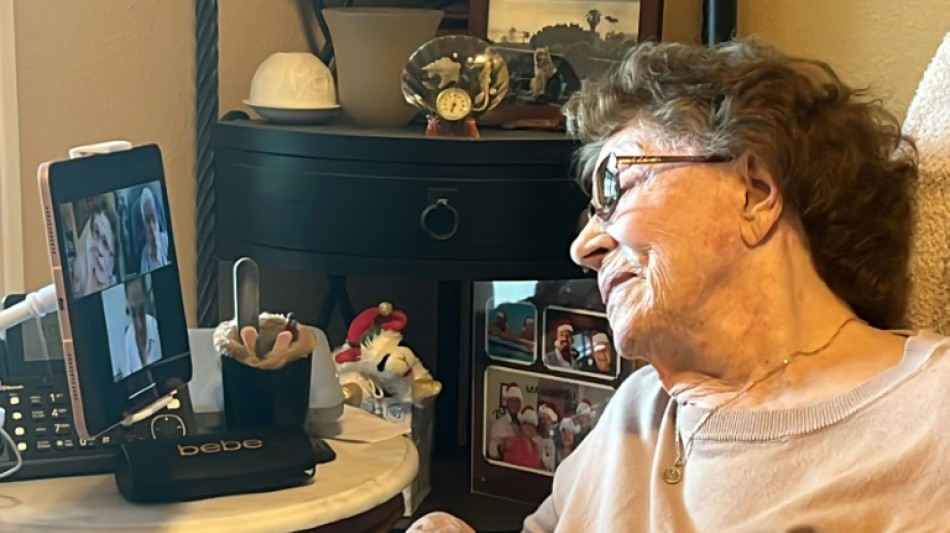
-
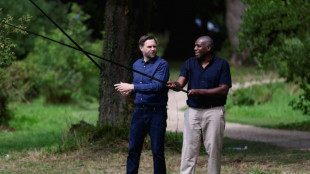 Vance and Lammy talk Gaza, fish as US VP starts UK holiday
Vance and Lammy talk Gaza, fish as US VP starts UK holiday
-
Israel plans to 'take control' of Gaza City, sparking wave of criticism

-
 Putin taps key allies ahead of Trump summit, sanctions deadline
Putin taps key allies ahead of Trump summit, sanctions deadline
-
Two tourists die, fires erupt in Greece amid gale-force winds

-
 Lens sign France international Thauvin from Udinese
Lens sign France international Thauvin from Udinese
-
Gold futures hit record on US tariff shock, stocks wobble

-
 Man Utd training ground upgrade will foster 'winning culture': Ratcliffe
Man Utd training ground upgrade will foster 'winning culture': Ratcliffe
-
Two tourists die at sea in Greece amid gale-force winds

-
 'Optimistic': Champagne growers hope for US tariff shift
'Optimistic': Champagne growers hope for US tariff shift
-
French firefighters optimistic after controlling vast wildfire

-
 Germany suspends arms exports to Israel for use in Gaza
Germany suspends arms exports to Israel for use in Gaza
-
Stocks waver, gold futures hit record on US tariff updates

-
 Guessand says he jumped at chance to join Aston Villa after sealing move
Guessand says he jumped at chance to join Aston Villa after sealing move
-
Israel to 'take control' of Gaza City, sparking wave of criticism

-
 Accumulating bitcoin a risky digital rush by companies?
Accumulating bitcoin a risky digital rush by companies?
-
Liverpool's Slot hints at fresh Isak bid despite 'attacking power'

-
 PSG to sign Lille goalkeeper Lucas Chevalier: source
PSG to sign Lille goalkeeper Lucas Chevalier: source
-
Oil industry presence surges at UN plastic talks: NGOs

-
 Kipyegon says a woman will run a sub-four minute mile
Kipyegon says a woman will run a sub-four minute mile
-
Tokyo soars on trade deal relief as most Asian markets limp into weekend

-
 Israel to 'take control' of Gaza City after approving new war plan
Israel to 'take control' of Gaza City after approving new war plan
-
Australian A-League side Western United stripped of licence

-
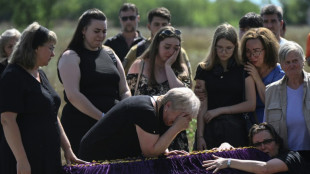 'Back home': family who fled front buried after Kyiv strike
'Back home': family who fled front buried after Kyiv strike
-
Indonesia cracks down on pirate protest flag

-
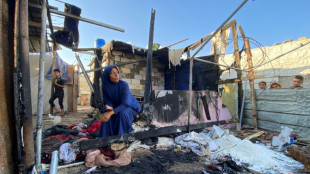 Israeli army will 'take control' of Gaza City: PM's office
Israeli army will 'take control' of Gaza City: PM's office
-
Australian mushroom murderer accused of poisoning husband

-
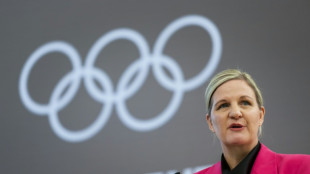 Coventry's mettle tested by Russian Olympic debate, say former IOC figures
Coventry's mettle tested by Russian Olympic debate, say former IOC figures
-
Library user borrows rare Chinese artwork, returns fakes: US officials
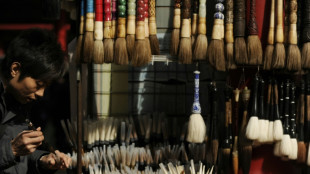
-
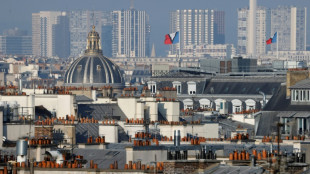 Parisians hot under the collar over A/C in apartments
Parisians hot under the collar over A/C in apartments
-
Crypto group reportedly says it planned sex toy tosses at WNBA games

-
 American Shelton tops Khachanov to win first ATP Masters title in Toronto
American Shelton tops Khachanov to win first ATP Masters title in Toronto
-
Tokyo soars on trade deal relief as Asian markets limp into weekend

-
 New species teem in Cambodia's threatened karst
New species teem in Cambodia's threatened karst
-
Australian mushroom murderer accused of poisoning husband: police

-
 Solid gold, royal missives and Nobel noms: how to win Trump over
Solid gold, royal missives and Nobel noms: how to win Trump over
-
Canadian teen Mboko outlasts Osaka to win WTA Montreal crown

-
 Trump to host Armenia, Azerbaijan for historic 'Peace Signing'
Trump to host Armenia, Azerbaijan for historic 'Peace Signing'
-
Israeli airline's Paris offices daubed with red paint, slogans
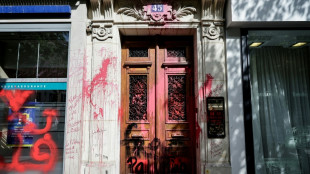
-
 US raises bounty on Venezuela's Maduro to $50 mn
US raises bounty on Venezuela's Maduro to $50 mn
-
Lebanon cabinet meets again on Hezbollah disarmament

-
 France's huge wildfire will burn for days: authorities
France's huge wildfire will burn for days: authorities
-
Bolivia right-wing presidential hopeful vows 'radical change'

-
 Trump says would meet Putin without Zelensky sit-down
Trump says would meet Putin without Zelensky sit-down
-
Trump offers data to justify firing of labor stats chief

-
 Bhatia leads by one at PGA St. Jude, Scheffler five adrift
Bhatia leads by one at PGA St. Jude, Scheffler five adrift
-
Disney settles Trump-supporting 'Star Wars' actor lawsuit

-
 Trump moves to kill $7 billion in solar panel grants
Trump moves to kill $7 billion in solar panel grants
-
Venus Williams falls at first hurdle in Cincinnati

-
 Mixed day for global stocks as latest Trump levies take effect
Mixed day for global stocks as latest Trump levies take effect
-
SpaceX agrees to take Italian experiments to Mars

| RBGPF | -5.79% | 71.84 | $ | |
| AZN | -0.89% | 73.4 | $ | |
| CMSC | 0.13% | 22.99 | $ | |
| BTI | 0.69% | 57.085 | $ | |
| RIO | 1.35% | 61.6 | $ | |
| CMSD | -0.13% | 23.49 | $ | |
| NGG | -0.91% | 71.43 | $ | |
| SCS | -0.63% | 15.9 | $ | |
| BP | -0.15% | 34.14 | $ | |
| SCU | 0% | 12.72 | $ | |
| RYCEF | -0.35% | 14.4 | $ | |
| GSK | 0.78% | 37.875 | $ | |
| RELX | -1.93% | 48.13 | $ | |
| BCC | -0.65% | 82.655 | $ | |
| VOD | 1.01% | 11.375 | $ | |
| BCE | 2.8% | 24.465 | $ | |
| JRI | 0.15% | 13.43 | $ |

French Resistance members reunited 80 years after end of WWII
Renee Guette, 98, laughed as she looked at her computer screen in Texas. On the other end of the video call was 97-year-old Andree Dupont, living in France.
The women, who supported the French resistance against Nazi occupation, had a moving reunion in April -- it was the first time they had seen each other since being freed from a German concentration camp 80 years ago.
"Dedee, it's funny to see you after all these years. We've become old girls!" Guette said, using Dupont's nickname.
"Seeing you again fills me with emotion," said Dupont, her voice trembling.
"I give you a big kiss, my darling," she added, blowing a kiss to the screen during the call, which was witnessed by AFP.
"Are the memories coming back for you too?" Dupont asked.
"Oh yes!" Guette said. "But they are not coming out of my head. There are too many things we can't explain."
As the 80th anniversary of Victory in Europe Day, marking the end of World War II on the continent, approaches, the women shared their emotional story of wartime sacrifice and suffering.
Dupont and Guette were both born in 1927 and grew up in French villages around 350 kilometers (220 miles) apart.
After World War II broke out and Nazi Germany invaded France, both women -- aged just 16 -- joined the resistance networks in their villages in 1943.
Dupont became a "liaison officer" transmitting messages -- and sometimes weapons -- across the western Sarthe region using only her bicycle.
One day, she recalled, "I had a towel with a dismantled revolved inside, and I smiled as I passed the Germans."
Guette was a postal worker who smuggled ration coupons and messages to resistance fighters.
- Deported -
In April 1944, disaster struck as Dupont was arrested along with other members of her village's resistance network -- 16 people in all, including her father and aunt.
"I was folding the laundry at around 10 at night. I heard knocking on the doors and knew what was happening right away," she said.
Guette was caught four days later by a French agent of the Gestapo, the secret police of Nazi Germany.
"He told me, 'So, a young girl from a good family who took a turn for the worst,'" Guette remembered. "And I told him that he hadn't turned out any better. And he slapped me!"
The two teenagers met at a prison in Romainville close to Paris. They learned about D-Day -- the Allied invasion of France in June 1944 -- but the glimmer of hope the news offered was soon crushed.
"We thought we were saved! But the Germans needed us to work in the war factories," explained Guette.
On June 25, 1944, Guette -- prisoner 43,133 -- was transferred to the HASAG Leipzig sub-camp linked to Buchenwald. It held 5,000 women forced to manufacture weapons. Dupont was prisoner 41,129.
The pair recalled working at night with newspaper shoved under their clothes to protect against the cold, their hair being infested with lice, and beatings from German guards.
They also described the naked bodies of those who did not survive, piled up and waiting to be moved to the crematorium.
"They did a lot of nasty things to us," said Guette.
- Freedom -
By mid-April 1945, weeks before the Allies accepted Germany's surrender, the Nazis evacuated the Leipzig camp, and inmates began the so-called "death marches," designed to keep large number of concentration camp prisoners out of Allied hands.
Guette told of walking all day and night with bloody feet, surviving only off rapeseed and potatoes.
She recalled washing for the first time in months in the Elbe, one of central Europe's largest rivers, and also a bullet whizzing past her left ear during fighting between the "Boche" -- a derogatory term for Germans -- and American soldiers.
Victory in Europe was formally declared on May 8, 1945, and the pair found themselves back in France.
In Paris, Dupont found her mother, and her father did return from the camps. But her aunt was killed in the gas chambers. Guette headed home on the train.
"You know what, Dedee. When I got there, I was not even sure I was home. Did that happen to you?" Guette asked.
Dupont replied: "I knew I was home when I saw the village clock tower."
Guette, who has lived in the United States since the 1970s, no longer travels to her home country but said she would like to see Dupont again, even if it means getting there "on all fours."
"Lots of love, Dedee, perhaps we'll find each other again up there," Guette said before the women ended their call.
R.Shaban--SF-PST
